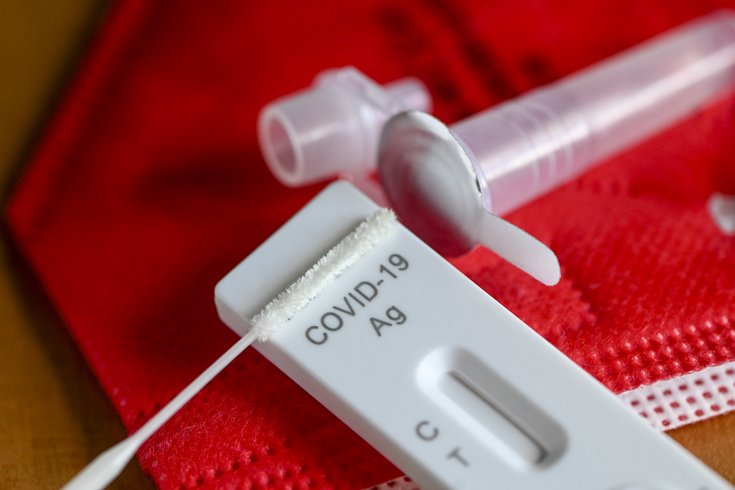
January 12, 2024
 Jens Kalaene/Picture Alliance/Sipa USA
Jens Kalaene/Picture Alliance/Sipa USA
COVID-19 cases are surging again in Philadelphia and nationally, as revealed by wastewater data. But hospitalizations and deaths have remained low compared to previous spikes.
Philadelphia is in the midst of another COVID-19 spike, as revealed by the city's wastewater.
Though the city and state of Pennsylvania stopped reporting weekly COVID-19 cases after the federal public health emergency expired last May, Philadelphia officials still test the wastewater from three treatment plants for traces of the coronavirus twice a week. Since last fall, concentrations of COVID-19 have spiked at all three plants.
At the Northeast Water Treatment Plant near Bridesburg, for example, health officials reported 41,822 gene copies of the virus per liter of water in September. By December, that number was more than 10 times higher, at 463,665 gene copies per liter.
Though these numbers do not translate to a finite total of COVID-19 cases, "when wastewater goes up, cases are also rising," James Kyle, a media coordinator for the Philadelphia Department of Public Health, explained via email. Federal health agencies have likewise observed this trend; the Centers for Disease Control and Prevention lists COVID-19 viral activity in U.S. wastewater as "very high" as of Thursday.
Yet unlike previous COVID-19 surges in April 2020 and January 2022, this current wave has not been accompanied by massive increases in hospitalizations and deaths. Philadelphia reported a slight bump in COVID-19 hospital admissions between July and December, when numbers rose from single digits to a high of 37, but hospitalizations returned to 1 in the first week of January. Deaths from COVID-19 never rose above 4 per week during that same time period.
By contrast, weekly hospitalizations peaked at 886 and weekly deaths at 122 during the height of the omicron surge. In April 2020, weekly hospitalizations topped out at 837 and weekly deaths at 248.
Dr. Judith O'Donnell, section chief of infectious diseases at Penn Presbyterian Medical Center, said vaccinations and "some degree of immunity in the community" likely have played a role in keeping severe cases low. But the drop in routine COVID-19 testing for all patients admitted to hospitals also could be a factor.
"We were doing testing on everybody," she explained. "We were picking up everybody, including people with minimal or no symptoms. And because those patients were being admitted to hospitals, they were being counted as COVID hospitalizations. Which is fair. But they weren't actually being treated for symptomatic COVID in some cases.
"Some of that is probably actually more reflective of a more accurate metric of people being hospitalized for their COVID as opposed to just incidentally found to be COVID positive or being hospitalized with it, but not because of the disease."
O'Donnell and Kyle each said holiday travel and gathering have contributed to the current surge, along with the highly transmittable JN.1 variant, which now accounts for 62% of all recorded cases. O'Donnell also pointed to a widespread decline in masking compared to the early years of the pandemic. Over the past week, several Philadelphia-area hospital systems have reinstated mask mandates for patients and visitors, including Temple Health, Cooper University Hospital and Main Line Health. Masks are now required in the emergency departments of Penn Medicine, Jefferson Health and the Children's Hospital of Philadelphia, and strongly encouraged in other parts of their hospitals.
While the current COVID spike appears less severe at the moment, O'Donnell cautioned that it is still very much ongoing and the data still developing.
"We're a little bit too early, I think, to really make a final decision on what this all looks like," she said. "As we all know from prior years, hospitalizations and deaths can lag behind. So I don't know that we can say for sure what this means, and I don't see the numbers plateauing yet, let alone going down."
In the meantime, she recommended getting vaccinated to prevent hospitalization and death, as well as long COVID. A study published Thursday in The Lancet concluded that vaccinations "consistently" reduce the risk of developing long COVID symptoms, which can linger weeks, months or even years after initial infection.
Follow Kristin & PhillyVoice on Twitter: @kristin_hunt
| @thePhillyVoice
Like us on Facebook: PhillyVoice
Have a news tip? Let us know.